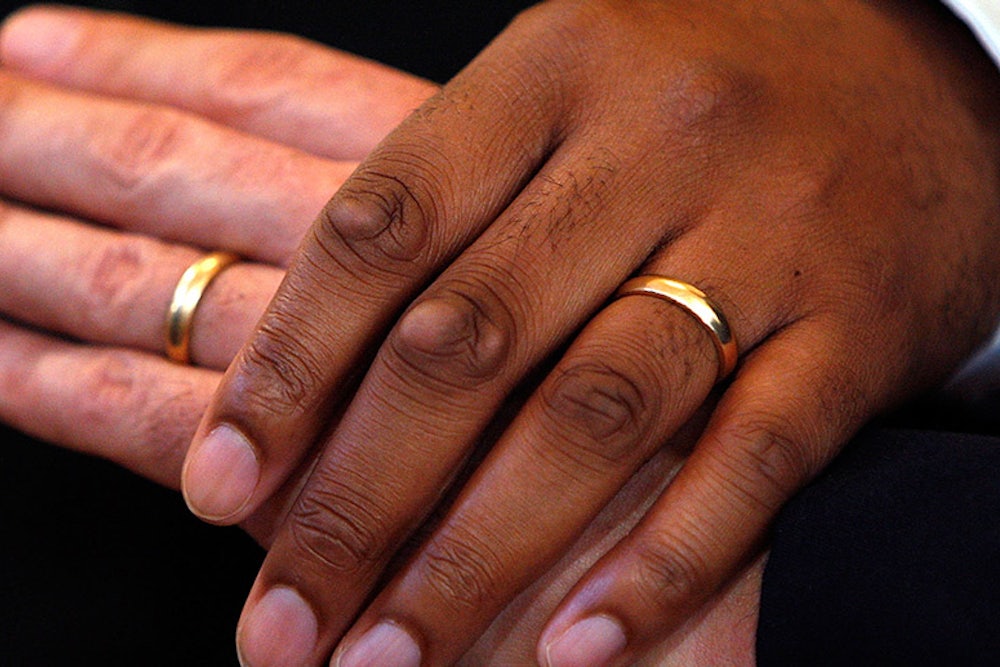In the past year, despite an incredible expansion of LGBT rights, American parochial school teachers and administrators have been fired for marrying people of the same sex. Here's one such story. Here's another.
I don't really understand what one's marriage status has to do with his ability to teach English, but apparently most conservatives do, because I don't think I've seen a single article by a prominent conservative expressing outrage on Ken Bencomo's behalf. In his case, they would presumably argue that the religious rights of the employer trumps his civil rights, but more to the point, few of them would argue that his employer was wrong to fire him.
At the same time they do believe Mozilla's board of directors was wrong to run deposed CEO Brendan Eich out of his job. That's not necessarily inconsistent, but it becomes inconsistent when the principles they claim are at stake change so that they can avoid making normative claims about the views and actions of the people who lost their jobs.
Here's another way to put it: when shared rights come into conflict in a way that pits an anti-same sex marriage individual or group against another individual or group, many conservatives will rally to the side of the anti-same sex marriage party no matter the circumstances. That's fine, I suppose. But they shouldn't pretend in one case that they're taking a principled stand for the liberty of employers, and then in another case that they're taking a principled stand for the liberty of employees. They should just say they align with anti-SSMers, and want to make sure their views aren't rendered anathema or their livelihoods challenged as the cultural ground shifts beneath them.
And that's what I take Ramesh Ponnuru to be doing in response to my inaugural column here. He believes that Mozilla was within its rights to fire Eich, but that Eich shouldn't have been fired, because he doesn't believe opposing same sex marriage in the way Eich does is a practice any employer should discriminate against, including when we're talking about the CEO of a company like Mozilla: "A lot of people don’t think that religious conservatives… should be treated the way we treat white supremacists. Of course that’s something that large numbers of people will, quite rightly, protest."
Ponnuru implicitly evokes a great purge of anti-same sex marriage conservatives from polite society. But while it's true that opposing same sex marriage is becoming less and less tolerated within society, society doesn't treat same sex marriage opponents anything at all like white supremacists. Brendan Eich lost his job, but I believe he would have lost much more if he'd been outed as a Klansman.
Meanwhile, in the here and now, gays and lesbians are much more likely to be discriminated against in the work place than anti-SSM religious conservatives.
The one realm in which that may not be true any longer is in the exclusive world of executives, celebrities, and national politicians. But that's just another way of saying that people who speak on behalf of large entities or depend for their success on enduring public support may face repercussions if they espouse any controversial views.
It's no coincidence that my previous article referenced the Dixie Chicks, Phil Robertson, and Brendan Eich. These people are lightning rods in everything but the literal sense of the term. They are the spires atop monuments to their own creativity. By contrast, it's extremely unlikely that a Dixie Chicks roadie, or a Duck Dynasty cameraman, or a Mozilla programmer would be outed or fired or on the wrong end of a pressure campaign for opposing the Iraq war a decade ago or supporting Proposition 8 or for engaging in myriad other contentious forms of political speech.
In a similar vein, Shirley Sherrod was only fired because a selective editing of her public speech made it look like she had infused racial bias into her exercise of state power. If she had actually done this, firing her would have been the right thing to do. If her remarks had been contextualized from the outset, she would have never been fired.
Meanwhile plenty of conservative CEOs across the country remain at the helms of their companies and face little to no risk of being ousted for espousing impolitic views.
All of which is to say that the purge conservatives fear isn't actually materializing. What is materializing is a society in which espousing anti-gay views is more likely to carry professional consequences than actually being gay. Perhaps even one where religious institutions don't discriminate against gays and lesbians in their hiring practices, even if they continue to do so in their liturgy. Where future Ken Bencomos don't fear losing their jobs, because almost nobody really thinks they should be fired. And that's something we should celebrate.
